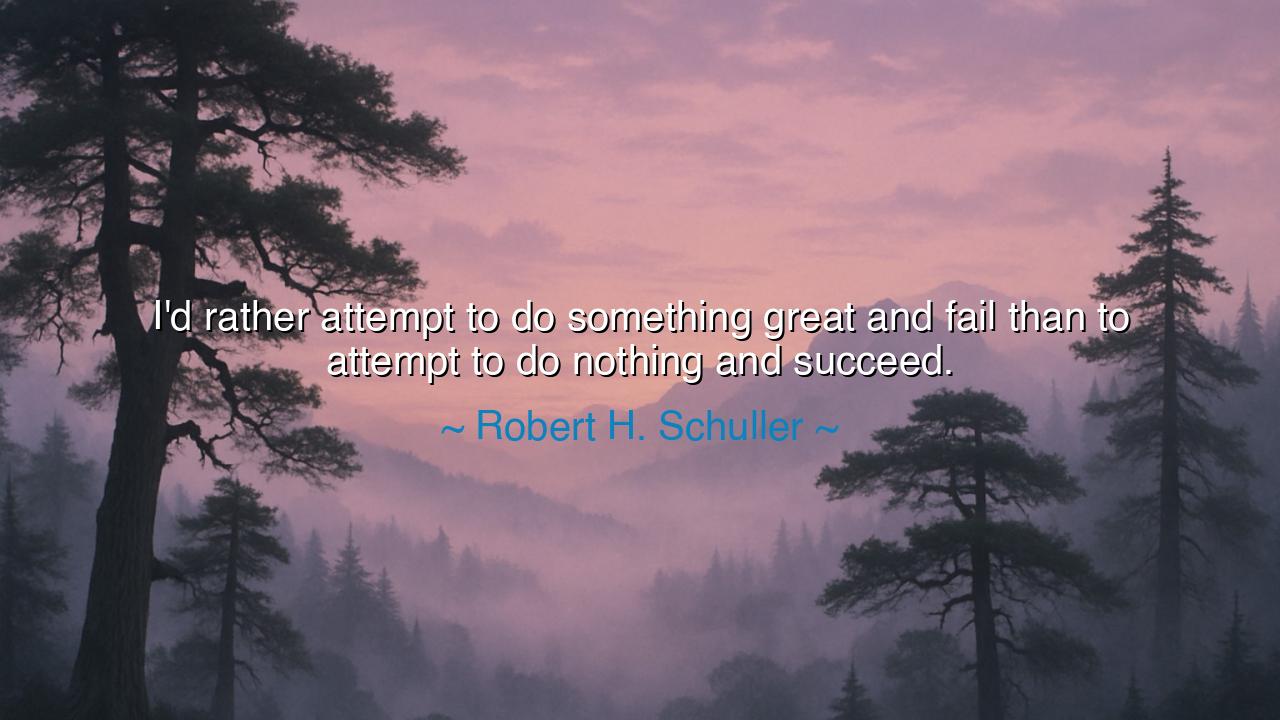
I'd rather attempt to do something great and fail than to attempt
I'd rather attempt to do something great and fail than to attempt to do nothing and succeed.






The words “I’d rather attempt to do something great and fail than to attempt to do nothing and succeed” were spoken by Robert H. Schuller, a man whose faith and vision built not only churches of stone but temples within the hearts of men. His words ring with the eternal courage of the human spirit — the same fire that burned in the hearts of explorers, inventors, prophets, and dreamers since the dawn of time. This quote is not merely a call to ambition; it is a call to bravery, a defiance against the numbing comfort of inaction. It teaches that the worth of life lies not in safety, but in striving toward greatness, even when the path leads through the valleys of failure.
In every age, the wise have known that failure in noble effort is holier than success in cowardice. The man who does nothing cannot stumble, but neither can he rise. The one who never risks cannot be broken, but neither can he be fulfilled. To attempt something great, even in the face of defeat, is to declare that your soul was made for more than mere survival — it was made to create, to dare, to illuminate the world with the imprint of your striving. Schuller’s words remind us that mediocrity is the quiet enemy of the human spirit; it is a success purchased at the cost of the soul’s own light.
The ancients told this truth through myth and legend. Consider Icarus, who, though he fell from the sky, dared to fly higher than any man before him. His wings melted in the sun, yet his name endures when countless others — those who walked safely below — are lost to time. His fall was not a failure, but a victory of spirit, for he lived as few dared to live. Schuller’s words echo the same timeless principle: it is better to burn in the pursuit of the divine than to live forever in the shadow of fear.
History, too, bears witness to this eternal truth. When Christopher Columbus set sail into uncharted waters, the world called him mad. The seas were filled with monsters, they said; he would vanish into the abyss. Yet he sailed on — not because he was certain of success, but because he was certain that to do nothing was worse than to fail. He faced storms, mutiny, and despair, but he discovered a new world. Whether one praises or condemns him, his courage changed the course of history. The timid stayed behind, safe but forgotten. Columbus dared — and by daring, he entered the pages of eternity.
To attempt something great is not merely an act of ambition, but of faith. It is faith in one’s own potential, and faith in the idea that even failure has meaning when it is born of purpose. Every great creator — from Michelangelo to Marie Curie, from Galileo to Gandhi — walked through the valley of defeat before reaching the heights of glory. The great oak does not fear the storm, for it knows that every gust strengthens its roots. Likewise, the soul grows not in comfort, but in the struggle toward greatness.
There is a sacred irony in Schuller’s words: those who fear failure most often fail at living. To “attempt nothing and succeed” is to achieve a hollow victory — a life free of risk, but also free of passion, growth, and meaning. The man who does nothing may be praised for his prudence, but when his days end, he will look upon his life and see not triumph, but emptiness. For existence without daring is a kind of death in disguise. The ancients would have called such a life a “shadow life” — safe, perhaps, but dim and unreal.
Thus, the lesson is clear: Do not measure success by outcome, but by effort. Greatness lies not in the crown, but in the climb. Let your dreams be vast enough to scare you, for that is the sign they are worthy. If you fall, fall forward — toward wisdom, toward experience, toward truth. The scars of effort are the jewels of the soul. Better to fail in greatness than to rot in comfort, for the gods favor the bold, and history remembers the dreamers who dared.
So, children of tomorrow, heed Schuller’s teaching. When you stand at the crossroads of fear and faith, choose the path that demands courage. Attempt something great — write your book, build your vision, love without restraint, strive for the impossible. If you fail, let your failure thunder through the ages as proof that you lived. For in the end, it is not the one who succeeds in doing nothing who leaves a mark upon the world, but the one who fails gloriously in pursuit of greatness — and rises, again and again, until even failure itself bows in respect.






AAdministratorAdministrator
Welcome, honored guests. Please leave a comment, we will respond soon